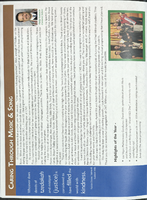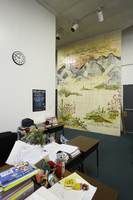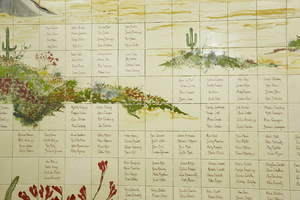Search the Special Collections and Archives Portal
Search Results
Michael S. Mack oral history interview
Identifier
Abstract
Oral history interview with Michael Mack conducted by Barbara Tabach on May 20, 2015 for the Southern Nevada Jewish Heritage Project. Mack discusses his early memories in the Las Vegas, Nevada Jewish community, attending the Fifth Street School, and participating in activities with his friends. He also reminisces about going to the Flamingo Hotel with his parents to see floor shows.
Archival Collection
Don Ross oral history interview
Identifier
Abstract
Oral history interview with Don Ross conducted by Barbara Tabach on February 15, 2017 for the Southern Nevada Jewish Heritage Project. Ross talks about his Jewish upbringing, and education in Brewster, New York. He also discusses how his interest in hotel catering, conventions and events, has led him to working in the hospitality industry for nearly three decades in Las Vegas, Nevada.
Archival Collection

Annual report from Congregation Ner Tamid, 2008-2009
Date
Archival Collection
Description
Annual report from Congregation Ner Tamid, 2008-2009
Text

Viola Johnson oral history interview
Identifier
Abstract
Oral history interview with Viola Johnson conducted by Claytee D. White on March 03, 1996 for the Women's Research Institute of Nevada (WRIN) Las Vegas Women Oral History Project. Johnson discusses leaving Fordyce, Arkansas in 1942 to join her parents in Las Vegas, Nevada where her first home was a tent. Johnson goes on to discuss life with her parents in Las Vegas including their work and church activities. Johnson also describes her work at the Flamingo Hilton and Sands Hotel and Casino as a maid, and at the Riviera Hotel and Casino making sandwiches. Finally, Johnson talks about labor conditions and the Culinary Union during the early years of the Las Vegas Strip casino development.
Archival Collection

Photograph of Sisterhood Wall at Temple Beth Sholom's former facility on Oakey Blvd., Las Vegas, Nevada, May 19, 2016
Date
Archival Collection
Description
Constructed as decorative fundraiser for the Temple Beth Sholom Sisterhood, the wall has remained a fixture in the former temple building at 1600 E. Oakey Blvd. The facility now houses the Innovations International Charter School of Nevada.
Image

Photograph of Sisterhood Wall at Temple Beth Sholom's former facility on Oakey Blvd., Las Vegas, Nevada, May 19, 2016
Date
Archival Collection
Description
Constructed as decorative fundraiser for the Temple Beth Sholom Sisterhood, the wall has remained a fixture in the former temple building at 1600 E. Oakey Blvd. The facility now houses the Innovations International Charter School of Nevada.
Image
Jessie Emmett oral history interview
Identifier
Abstract
Oral history interview with Jessie Emmett conducted by Irene Rostine on October 16, 1996 for the Women's Research Institute of Nevada (WRIN) Las Vegas Women Oral History Project. Emmett discusses moving from Southern California to Nevada for her husband's job at the Nevada Test Site in 1954. Emmett goes on to discuss working at the New Frontier Hotel briefly, and her eventual decision to go into real estate. Emmett then talks about creating a real estate agent training program, and about the work environment for women real estate agents. Lastly, Emmett describes her experience running her own real estate office, and the personal satisfaction the job provided.
Archival Collection

Transcript of interview with Nancy Houssels by Caryll Batt Dziedziak, November 18 & December 14, 1998
Date
Archival Collection
Description
What is the importance of dance? For Nancy Claire Houssels, it has simply shaped her life! Born on February 26, 1935 to Edith Darlene Wallace and William Edwin Wallace, Nancy grew up with three brothers in an athletic household in Piedmont, California. She began dancing at the early age of three and filled her childhood years with dance and synchronized swimming. After attaining a Bachelor of Arts Degree in Theatre Arts from UCLA in 1957, Nancy went on the road with the Hollywood Bowl; soon meeting her future dance partner, Francois Szony. Already known as one of the most respected adagio dancers in the world, Szony would become Nancy’s dance partner for the next ten years. The Szony and Claire adagio team rehearsed in New York City before heading off to their first European engagement at the London Palladium. The team spent the next few years appearing in London, Copenhagen, Paris, Vienna, Rome, Turino, Milan, Barcelona, and even Beirut. Their physical ability to perform breath-taking spins and lifts appealed to broad audiences; even those with little or no appreciation of ballet. After returning to the states, Szony and Claire performed in Miami, Puerto Rico, and throughout New York; including Radio City Music Hall, the Ed Sullivan Show, Carnegie Hall, and Madison Square Garden. In 1966, the dance team headed to Las Vegas, Nevada to appear with the Casino de Paris at the Dunes Hotel. Shortly thereafter, in 1968, Szony and Claire joined the cast of the Folies Bergere at the Tropicana Hotel. In May 1970, Nancy married J. Kell Houssels, Jr., then the President of the Tropicana Hotel. As Nancy likes to retell this moment, “Well, my husband fired me and we got married!” After more than thirty years of dancing, Nancy felt ready to end her professional dance career and looked forward to starting a family. Nancy and Kell subsequently had two children: Kelly Clair and Eric Wallace, and Nancy happily ‘inherited’ three stepchildren: Josh, Jake, and Leslie. The adjustment of shifting from a career characterized by a grueling work schedule to that of domestic life proved challenging for Nancy. She soon began looking for ways to involve herself in the community. Since the early 1970s, Nancy has lent her time and support to such diverse entities as Child Haven, Children’s Service Guild of the Clark County Juvenile Court System, National Conference of Christians and Jews, PBS Friends of Channel 10, Nathan Adelson Hospice, Meadows School, United Campus Ministry, Las Vegas Metropolitan Beautification Committee, McCarran Airport Arts Advisory Committee and the University of Nevada, Las Vegas Foundation. While Chair of the Nevada State Council of the Arts for seven years, she proved instrumental in establishing a Folk Arts program and expanding legislative funding for statewide arts programs. Nancy’s service to the community has been recognized with such awards as the 1985 Nevada Dance Theatre’s Woman of the Year, the 1988 Governor’s Arts Award - Distinguished Service to the Arts, the 1994 State of Nevada’s Women of Achievement, and the 1997 We Can, Inc.’s Chris Schaller Award for children’s advocacy. Although her days as a professional dancer had ended, Nancy never relinquished her love of dance. In 1972, Nancy joined Vassili Sulich in founding the Nevada Dance Theatre. As the principal dancer in the Folies Bergere, Sulich had organized a series of dance concerts for the Las Vegas community. Much to Nancy’s surprise, the Las Vegas community responded enthusiastically to the availability of ballet performances. Nancy quickly formed a volunteer board to raise the critically needed funding for this endeavor. She began with an evening fundraiser at her home, inviting a group of like-minded friends. This effort raised the initial fifteen thousand dollars that set the Nevada Dance Theatre on its way. In 1976, the company acquired its non-profit status and subsequently formed an academy to train children in dance. Nancy played an instrumental role in furthering the ballet company’s community outreach; creating such programs as Future Dance funded by the Lied Foundation. This program targets lower income children who attend at-risk elementary schools and provides them with free dance instruction…building self-esteem, confidence, and hope. In 1996, with a capital grant from the Donald W. Reynolds Foundation and land donated by the Howard Hughes Corporation, the Nevada Dance Theatre began drawing their plans for a world-class facility in Summerlin. Completed in 1999, the company now had a visible home within the Las Vegas community. Here, students from the Las Vegas community trained alongside the company’s professional dancers. Renamed in 1998 as the Nevada Ballet Theatre and with a new Artistic Director, Bruce Steivel, the Company continues to serve not only as a leading force for live performing arts, but also as a source of community outreach programs for children. Nancy continues to remain involved with the Nevada Ballet Theatre and currently serves as the Co-Chair of the Company. She believes her life experience reflects both the viewpoint of the artist and that of the audience. Indeed, her visionary leadership and love of dance has not only shaped her life but has nurtured the development of the cultural arts in Southern Nevada.
Text
Joan Driscoll oral history interviews
Identifier
Abstract
Oral history interviews with Joan Driscoll conducted by Kay Long on April 10, 1997 and April 17, 1997 for the Women's Research Institute of Nevada (WRIN) Las Vegas Women Oral History Project. Driscoll talks about her experiences as a juror on a federal grand jury that investigated organized crime in Nevada. Driscoll also briefly discusses her family history, her family's origins in Iowa, and her experiences moving to the West.
Archival Collection
